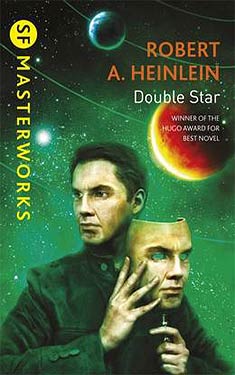GMRC Review: Double Star by Robert A. Heinlein
 Sarah Pinsker (SarahPi) writes songs and short stories and the occasional review. She will be making use of her blog at sarahpinsker.com again sometime in the near future. This is Sarah’s first GMRC review.
Sarah Pinsker (SarahPi) writes songs and short stories and the occasional review. She will be making use of her blog at sarahpinsker.com again sometime in the near future. This is Sarah’s first GMRC review.
 A couple of years ago I attended an event at which Connie Willis spoke about her research for Blackout and All Clear. She referenced numerous romantic comedies and several war movies in addition to her factual historic research. I don’t recall that she brought up many works of fiction, but Double Star was one of them, and it stuck in my mind as something I wanted to read. Between the Hugo win and the subject matter, I thought it would be worth a try.
A couple of years ago I attended an event at which Connie Willis spoke about her research for Blackout and All Clear. She referenced numerous romantic comedies and several war movies in addition to her factual historic research. I don’t recall that she brought up many works of fiction, but Double Star was one of them, and it stuck in my mind as something I wanted to read. Between the Hugo win and the subject matter, I thought it would be worth a try.
Willis said that Double Star was inspired by the story of M. E. Clifton James, who was sent to North Africa and Gibraltar in Field Marshal Montgomery’s place in order to confuse the Germans. She borrowed these events in her own depiction of the intelligence war. Heinlein‘s version is less madcap than the Willis version, and possibly less madcap than the true story, given that James was an alcoholic and a smoker (and was missing a finger!) and Montgomery was not.
Double Star is fast paced and somehow manages a light tone despite the serious subject matter. The Great Lorenzo (nee Lawrence Smith) is an out of work actor when he is plucked out of a bar to perform the role of a lifetime: impersonating the kidnapped Expansionist leader John Joseph Bonforte. At the beginning, the actor’s character is painted somewhat broadly. He spends a lot of time talking about his own acting chops, and it takes the reader a while to trust that he is actually as good as he says. This journey mimics that of Bonforte’s inner circle, who agree to the deception out of desperation, but have little confidence that it will work.
Most of this shortish novel takes place over the span of a few weeks. It manages to flesh out the political situation fairly quickly, and with enough depth that there is a sense of what is at stake in the impersonation gambit. The character development of the support players is a little lacking, but Smith is fully realized, as is Bonforte in a more oblique fashion. It’s interesting to see Smith’s own fears and prejudice and strong personality twist to conform with the role he is forced to play.
 On the whole, I think this book has aged well, but as usual with mid-century SF I had some issues with the characterization of women. Smith learned his profession from his father, but doesn’t seem to have had a mother to speak of. Bonforte’s assistant, Penny, is intelligent, but also moody and petulant and subject to fainting spells. She is also deep in unrequited love for Bonforte. Thankfully, she is only threatened with a spanking once by a co-worker. If it had been twice I would have been tempted to put the book down.
On the whole, I think this book has aged well, but as usual with mid-century SF I had some issues with the characterization of women. Smith learned his profession from his father, but doesn’t seem to have had a mother to speak of. Bonforte’s assistant, Penny, is intelligent, but also moody and petulant and subject to fainting spells. She is also deep in unrequited love for Bonforte. Thankfully, she is only threatened with a spanking once by a co-worker. If it had been twice I would have been tempted to put the book down.
I’m glad I didn’t put it down. I was impressed by the taut plotting and the contained timeline. I’d be very curious to find out where the breaks were in the original Astounding serialization. The will-he-be-found-out moments dripped with suspense, and Smith’s personal journey was well depicted. This is a worthy Hugo winner, and I’d place it near the top of my personal best-of-Heinlein list.



















 Full Details
Full Details


2 Comments
Thanks for the review. Certainly a (old) classic! To me the most interesting part of this book was the alleged copyright infringement controversy in the year 2000 by Glenn Brown’s artwork (http://www.plokta.com/plokta/issue22/glennbrown512.jpg) that looked strikingly similar to the cover art of one of the book’s earlier editions (http://www.plokta.com/plokta/issue22/TonyRoberts512.jpg), circa 1970. Other than that, albeit a somewhat satisfying read, I found the peculiar Heinlein-voice overbearing, the dialogue – dare I say – juvenile and the obvious pre-feminist cliches glaring. It’s quite asinine. Saying that, curiously, I will still give it to my son to read once he’s old enough to be introduced to SF proper. I really liked the Martians and agree that the plot is "taut" and the timeline "contained," making for a quick, suspense-ridden read. Heinlein’s writing does mature over time, although the moralizing, overbearoing voice remained, particularly in "Stranger in a Strange Land." I’m also glad that I persisted with it. I’ve started with "The Moon is a Harsh Mistress," considered to be one of his best, if not the best, and I’m intrigued to see how it compares to "Double Star."
I actually just finished reading "Double Star" not long ago, too! I also liked how taut the plotting was. Penny’s characterization was a bit irritating, though. She seemed incredibly childish and completely motivated by romantic love, though I did like that she had a bit of a role in the story beyond being pretty. I would agree that this novel has aged better than a lot of mid-century SF. It definitely seemed a little silly at points, but it was still a lot of fun to read. @Emil, it seemed to me that Heinlein’s ‘overbearing, moralizing’ tone was not as present here as it is in other of his works that I have read, but I have to admit that I am mostly comparing to "Stranger in a Strange Land". 🙂 I hope you like "The Moon is a Harsh Mistress". I think that one is a very interesting novel to compare to "Red Mars" in terms of how they treat the idea of revolution.
Sorry, the comment form is closed at this time.